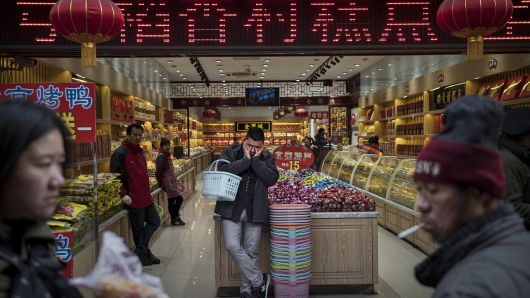
China on Friday reported industrial output and retail sales growth for the month of November that missed expectations, according to data from the National Bureau of Statistics, as the world’s second-largest economy started to show signs of slowing amid a bitter trade dispute with the U.S.
Industrial output in November grew 5.4 percent from a year ago — the slowest pace in almost three years as it matched the rate of growth seen in January to February 2016, according to Reuters records.
The growth in industrial production was lower than the 5.9 percent analysts in a Reuters poll had predicted.
Retail sales rose 8.1 percent in November — the weakest pace since 2003, according to Reuters’ records — lower than the 8.8 percent the analysts expected. November retail sales growth was down from 8.6 percent in October.
Fixed asset investment rose 5.9 percent from January to November, marginally higher than the 5.8 percent the economists had forecast. FAI rose 5.7 percent from January to October.
Economic data from China is closely watched by many amid the trade spate between the world’s two largest economies, with U.S. President Donald Trump taking issue with America’s massive trade deficit with China.
Despite escalating trade tensions with the U.S., Chinese data show the economy has surprised on the upside for much of 2018.
Manufacturing, in particular, has held up as exporters rushed to ship their goods — a phenomenon called front-loading — before tariff deadlines hit.
The weaker Chinese data in November shows that the positive impact of front-loading had begun to taper off and that downward pressure on the Chinese economy was increasing, wrote Sue Trinh, head of Asia foreign exchange strategy at RBC Capital Markets in Hong Kong.
The industrial output and retail sales data released on Friday were “ugly,” she added in a Friday note.
The Chinese statistics bureau said after the release of the data that the impact from bilateral trade tensions with the U.S. was not obvious yet, Reuters reported. “So the worst is yet to come and policymakers will be very worried, particularly with consumption growth falling off a cliff,” wrote Trinh.
At the G-20 summit in Argentina recently, Trump agreed to not raise tariffs on $200 billion worth of Chinese imports from 10 percent to 25 percent in January as he had previously threatened, according to a statement from the White House. But, if the two countries fail to reach a deal at the end of a 90-day ceasefire, the threatened tariffs will be implemented, the statement said.